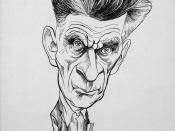"Siddhartha" was written by Hermann Hesse in 1922. Siddhatha is the story of a young Brahmin's search for ultimate enlightenment after realizing that he is not happy as a Brahmin. His search takes him from a life of decadence to ascetism, from the joys of loving a beautiful girl to the struggles with his son and the wisdom of ultimate renunciation. "Waiting for Godot" is a tragicomedy in 2 acts which was written by Samuel Beckett. The book tells the story of 2 people Vladimir and Estragon who are dead and are waiting at the gates of heaven and hell for God to come down to them and make his final decision on whether they should go to heaven or hell. Vladimir and Estragon go through the everyday phase of friendship while waiting for any signs of god.
Siddhartha is a loyal and devoted friend to Govinda. In the book Siddhartha; even though enlightenment is Siddhartha's primary goal and Govinda has nothing to do with it, Govinda accompanies Siddhartha on his journey to gain inner-peace.
When Siddhartha goes to meet the samanas early in the morning and he leaves his house he finds Govinda waiting there for him ready to leave:
"When in the first light of day, walking slowly on numb legs, he left the still silent town; a shadow crouching by the last hut stood up and joined the pilgrim: it was Govinda.
"You have come," said Siddhartha and smiled.
"I have come," said Govinda." (pg 11)
Siddhartha carries on to the Samanas without questioning Govinda about his motives as if understanding him through an undying bond of love and friendship.
The same can be said about Vladimir and Estragon. In Waiting for Godot; the play starts of by showing that Vladimir and Estragon are not...


